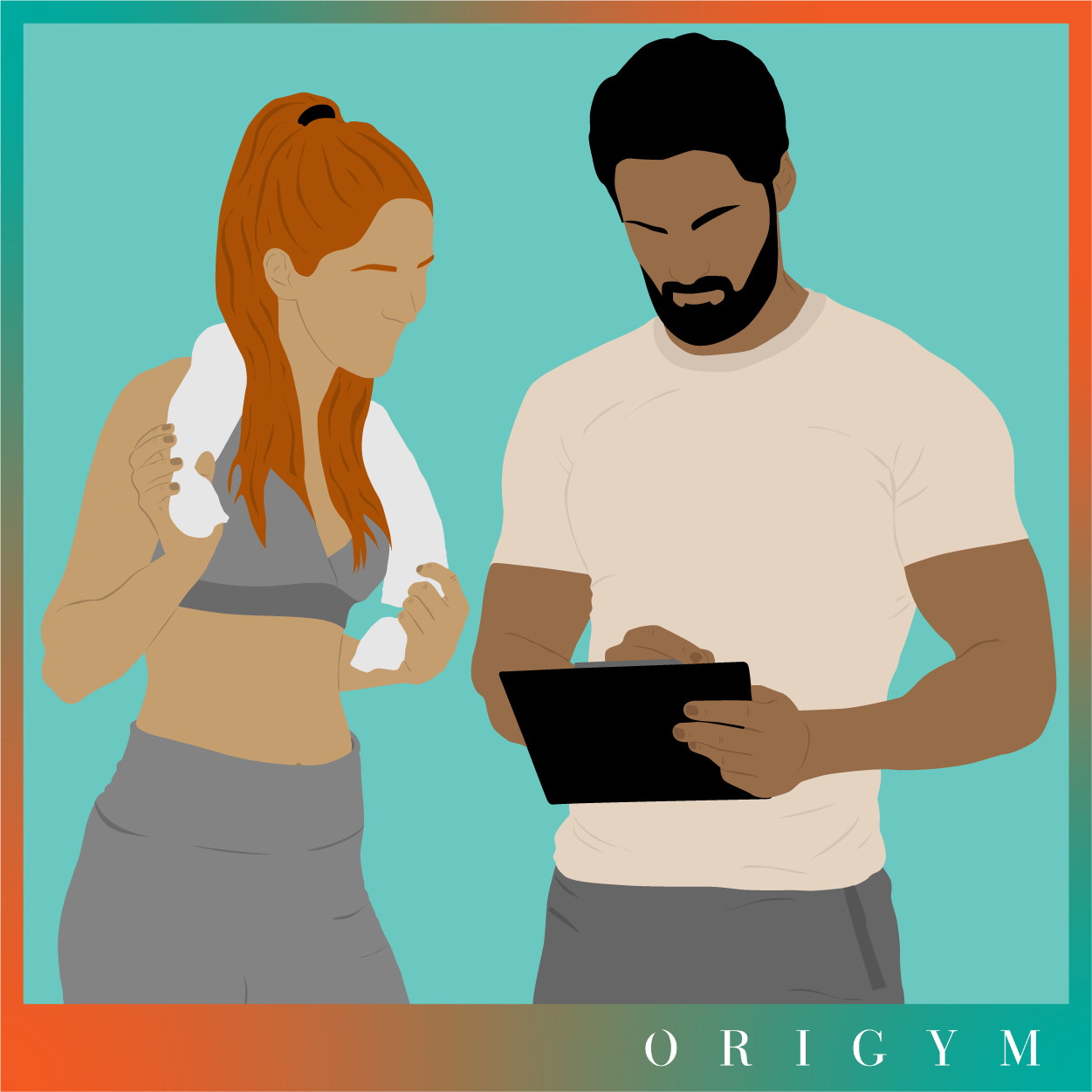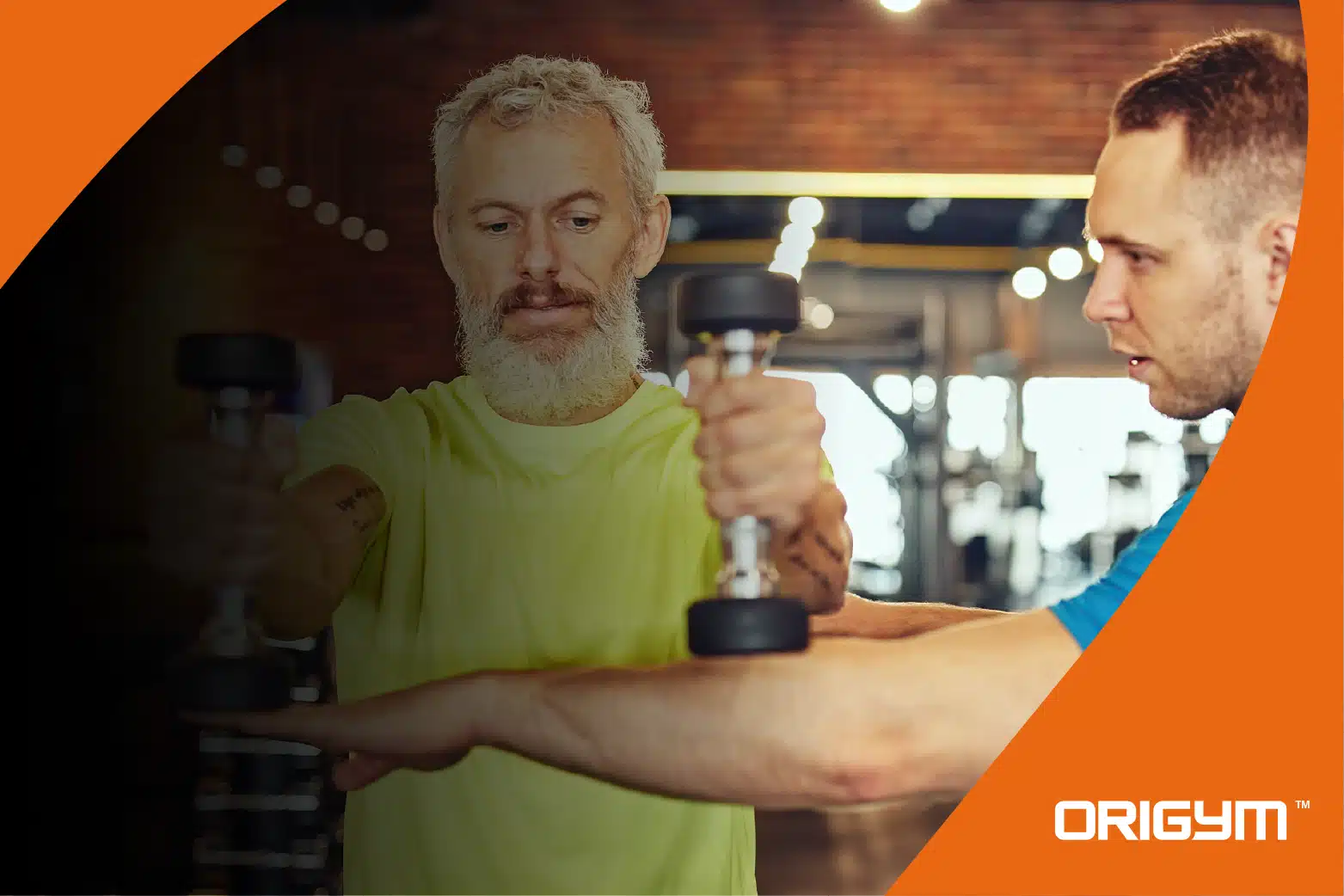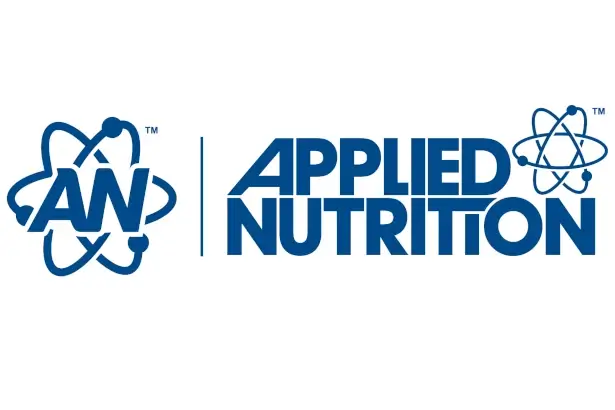If you’ve ever wondered “what do you need to be a personal trainer”, you might be a little confused, especially as it’s a job role that’s completely dependent on the clients you’ve got.
Fortunately, OriGym’s guide will provide you with everything you need to know to get started on the right foot.
Perhaps you’re just dipping your toe into the fitness water and you’re baffled by what you need to know to become a personal trainer. Or maybe you’re looking to brush up on the key skills that form personal trainer expertise so you can provide the best possible service to your clients.
Either way, our guide aims to address all the misconceptions that surround the things you need to know to become a personal trainer, as well as answer the questions you might have before you launch into your future career.
Contents:
- What Is A Personal Trainer?
- What A PT Needs To Know About The Fitness Industry
- Key Exercise Knowledge A Personal Trainer Should Have
- What A Personal Trainer Should Know About Clients
- What A PT Needs To Know About Diet
- Key Areas Of Personal Trainer Expertise
- What A Personal Trainer Needs To Know About Business
- How Can I Develop My Personal Trainer Knowledge?
- Our Conclusions
One thing you’ll always need to become a personal trainer, though, is a Level 3 personal training qualification.
OriGym leads the way with their unparalleled personal training diploma, offering 7-days-a-week expert guidance, international accreditation and recognition, a wealth of completely free resources, and guaranteed post-course interviews. And all for the lowest price amongst our closest competitors.
Download our FREE comprehensive prospectus today, and learn more about what we offer, and how it could be ideal for you.
What Is A Personal Trainer?
This may seem like a redundant question, especially as we’ll primarily be answering the question of “what do you need to be a personal trainer”, rather than defining the role.
However, we always feel it’s important to address any misconceptions, especially as the fitness industry has so many roles that overlap or have similar functions.
A personal trainer works on a 1-to-1 basis with clients, providing bespoke advice on exercises and workout routines that are tailored to their individual needs and goals. A PT will also dispense advice on diet, and making sustainable lifestyle adjustments that can lead to much larger-scale changes – though note that they are not qualified to prescribe diet plans, only offer guidance.
They’ll always be a certified professional, having completed a Level 4 personal training qualification at the very least, with many successful PTs having gained additional certifications outside of that initial qualification. But what about your own personal trainer knowledge? What do you need to be a personal trainer?
Let’s look more closely at some key areas that make up what a personal trainer needs to know to be successful and prosperous in the fitness industry.
What A PT Needs To Know About The Fitness Industry
As with any job in any industry, it’s always important to be aware of what’s changing, what you need to stay up to speed, and how future developments could impact you and your business.
This is especially important in fitness, as it’s one of the fastest evolving industries, and it can be highly competitive (we’ll look at how to set yourself apart from the crowd later in this article).
First and foremost, it’s vital to ensure any qualification you complete is registered under CIMSPA (the Chartered Institute for the Management of Sport and Physical Activity), as this is an internationally recognised awarding body, and one that any prospective employer (and clients) will be looking for.
Now, the vast majority of course providers will work closely with CIMSPA (including the industry leader OriGym), but it is hugely important to ensure that your course provider works with them, especially as this can affect your employment prospects.
You’ll also need comprehensive insurance to ensure you’re fully covered once you’ve qualified, which is often a vital element of personal trainer knowledge that gets overlooked.
It’s also a great idea to stay abreast of developments in the fitness world – following specialist news sites and blogs (such as the well-renowned OriGym blog) can help you brush up on what a personal trainer needs to know about the changing landscape of the fitness industry.
Finally, and arguably most importantly, it’s vital to be aware that fitness is an incredibly competitive field – OriGym alone qualifies thousands of budding fitness enthusiasts every year.
The most effective way to stand out is to ensure you’re aware of exactly what you need to know to become a personal trainer, and to put as much effort into those areas as you can.
Key Exercise Knowledge A Personal Trainer Should Have
This is, as you might expect, quite a broad field, especially as there are so many exercises and variants out there that you could incorporate into your client routines and schedules.
Crucially, when you’re looking at what a personal trainer needs to know about exercise, you absolutely must be adaptable. Learning the gym floor and the machines that will be available to you, is a necessity, and it’s a piece of personal trainer knowledge that will ensure you’re ahead of the game.
It’s also important to recognise that not all your clients will be able to, or want to, complete the same regimes, and as such, you’ll need to create tailored solutions that work for both you and your client.
For instance, if a client is focused on building strength in their legs, you’ll need to be familiar with a wide range of exercises that activate those muscle groups (such as weighted squats, lunges, or the leg press).
Or, if all the machines are unavailable, you’ll need to ensure you understand how to construct a workout that incorporates the benefits of calisthenics (or bodyweight training) and utilises minimal equipment but still targets the desired muscle groups.
While this may seem a lot of information to digest at once, it’s important to recognise that much of this is encompassed in all good training courses, most notably OriGym’s Level 4 personal training qualification.
What A Personal Trainer Should Know About Clients
This is perhaps the most important section of this article – without clients, personal trainers simply wouldn’t exist, and the industry wouldn’t be thriving like it currently is. But what do you need to be a personal trainer who understands their clients, and can ensure that their relationship is built on trust and respect?
First and foremost, it’s important to recognise that no two people are the same, and that is especially true of exercise and fitness journeys.
As we’ve just examined with our section on exercises and what a personal trainer needs to know about how to tailor them specifically, everyone will have different goals, and therefore different reasons for signing up with your personal training services.
Understanding what each of your clients wants to achieve, what they can do to get there, and how you can help them realise those ambitions, is vital to providing the kind of quality service that clients will want to continue using.
It’s what forms the foundation of holding onto your personal training clients, which is crucial to creating a name for yourself in the fitness industry.
From our extensive experience in the industry, one of the lesser known things you need to know to become a personal trainer who’s successful is knowing how to market yourself towards the clients you want.
For instance, if you’re a PT whose passions lie in training those who are at the peak of their physical fitness, perhaps people training for competitions or events, you can work on building your skillset with additional professional development courses, such as Sports Massage Therapy, or Sports Nutrition.
Or, if you’d prefer to diversify into weight management, you can look into qualifications that allow you to appeal more to those clients that are looking to achieve weight loss goals, such as weight management training, which helps you develop a much more complete picture of nutrition and diet.
What A PT Needs To Know About Diet
Of course, as part of your personal trainer course, you’ll be given a general overview of macro and micro-nutrients, as well as how to properly structure meals and meal plans in order to maximise what you get from your diet.
This grounding will allow you to not only dispense informal advice to your clients, but it can help to shape your workouts and regimes. For example, you might do a particularly intense workout when you know your client will be consuming a well-balanced meal that incorporates substantial protein sources.
It’s also vital to be on top of what you personally eat, as this can have a drastic influence on the advice you impart to your clients.
Following your own structured personal trainer meal plan can help you take stock of the foods that you think could be helpful for your clients, and what you feel is sustainable or manageable for that individual. Diet is, we believe, a huge part of weight loss, and understanding your client’s goals with regards to weight is crucial.
It’s also important to consider any allergies, intolerances, or preferences when giving nutritional advice, especially as this can hugely affect the foods you recommend. Learning how plant protein and animal protein sources differ is integral to planning meals for a vegan client, for instance.
Ultimately, though, diet forms another important part of what a personal trainer needs to know to be effective and efficient in creating sustainable, manageable and fulfilling plans for your clients.
Key Areas Of Personal Trainer Expertise
So far, we’ve covered some of the more pressing duties of a personal trainer, and what a personal trainer needs to know to be able to carry these out efficiently and effectively. But, there are many other skills and areas of personal trainer expertise that all shape how impactful your sessions are, and how influential you are as a PT.
We’ve outlined some of the more important personal trainer skills you can supplement your personal trainer knowledge with:
- People Skills – Having a sympathetic understanding of your clients, and learning what motivates them to push towards their goals, is a crucial part of being the PT you want to be.
- Punctuality – It might seem a little basic, but having a great grasp of the time you have available, and how you can best apportion it to maximise your client satisfaction and your earnings, is vital.
- Health and Safety – Having a thorough grasp of your gym’s health and safety procedures and protocols (or fully understanding your own, if you’re a freelancer) is incredibly important, as this won’t only keep your clients safe, it ensures you’re providing as safe a service as possible.
- Human Anatomy & Physiology – A good knowledge of the human body, and how the decisions you’ll be making for your client will affect it, is an ideal skill to have, as it can allow you more comprehensively explain your ideas to you client with scientific precision. This is included as part of some Level 4 personal training courses, with OriGym’s expert team leading the way in this regard.
Of course, as you develop and grow in your role as a personal trainer, you’ll begin to better see how each of these skills (combined with your own personal outlooks and opinions) are integral parts of what you need to know to become a personal trainer who not only succeeds but thrives in their industry.
What A Personal Trainer Needs To Know About Business
While this area of personal trainer expertise is particularly important for those who are working on a freelance basis, or those that aren’t partnered with a gym chain, it is vital for personal trainers to be aware of the business elements that form part of their role.
When you work as a personal trainer, you’ll essentially be running your own business in an industry you’re passionate about, which is a dream come true for many. However, this does mean that you’ll need some awareness of what you need to do to continue to prosper.
Firstly, it’s important to promote yourself and your services. This can be done in a variety of ways, but we’ve compiled a short list of some of the strategies we’ve seen success with:
- Social Media – Once you’ve completed your Level 3 personal trainer qualification, get yourself set up on popular social media platforms such as Instagram and Twitter, as this not only allows you to promote yourself, but you can also keep up to date with the latest developments in fitness.
- Fliers and Business Cards – Handing these out to family and friends, as well as to other gym goers, can allow you to rapidly and effectively spread the word about your personal training business.
- Website – Having a well designed, easy to use personal training website establishes a foundation for your business, and can go a long way to promoting you as an established face in the fitness industry.
You’ll also need to familiarise yourself with how best to manage your personal finances, and the finances of your personal training business, especially as you continue to grow in the fitness industry.
We’d suggest using a piece of financial software to help you keep on top of what your clients are paying, manage bookings and cancellations, and apportion your time effectively to keep your customers happy, and your profits high.
By qualifying through OriGym’s signature personal training courses, you’ll also be eligible for a host of discounts on a wide range of incredibly helpful softwares and products, including those that provide crucial guidance on tricky areas, such as tax returns.
How Can I Develop My Personal Trainer Knowledge?
Unfortunately, these ideas and our expert advice can only take you so far when it comes to what a personal trainer needs to know – you’ll have to undertake formal qualifications in order to truly progress in the industry, and develop both as a professional and as an individual.
That’s where further study courses come in – they offer opportunities for people in a professional capacity to develop new skills, especially those who are in the fitness industry, after you’ve completed your Level 4 personal trainer qualification.
Take, for instance, OriGym’s industry-leading sports nutrition course. You’ll have already laid the foundation of your personal trainer knowledge by completing your initial Level 4 personal training certificate, but with the Level 5 qualification that a sports nutrition course offers, you’ll be able to elevate your personal trainer expertise.
You’ll not only learn countless new skills (such as developing a complete understanding of nutrition legislation, and building a mastery of the bond between diet and exercise), but you’ll be able to apply those skills to your current clientele, helping them in ways that can revolutionise how they go about achieving their goals.
We’d also suggest undertaking qualifications and CPD courses that can allow you to fulfil other duties that might form part of your PT duties, as these can hugely benefit you in the long term, and improve your confidence, especially when it comes to working in group personal training sessions.
Ultimately, though, there are numerous different avenues that open up once you qualify as a personal trainer, and discovering the qualifications that best suit you and your skillset can help to shape your career.
Before You Go!
When it comes to personal trainer knowledge, there’s a huge amount of development opportunities, and additional study you can undertake to boost your understanding of fitness, diet, and the exercise industry as a whole.
Our guide aimed to provide an overview of what a personal trainer has to know, and whether you were looking for key skills to work on as part of your personal trainer expertise, or you wondered what you need to be a personal trainer, we’ve provided everything you’ll need to start a prosperous career in fitness.
All that remains is to qualify as a Level 4 personal trainer.
OriGym’s unmatched personal training qualifications lead the industry, combining affordability and flexibility with our payment plans, 7-days-a-week expert support, unlimited career advice, and countless opportunities for development.
Check out our prospectus for the full run-down on what we offer, and how it could be perfect for you!






















